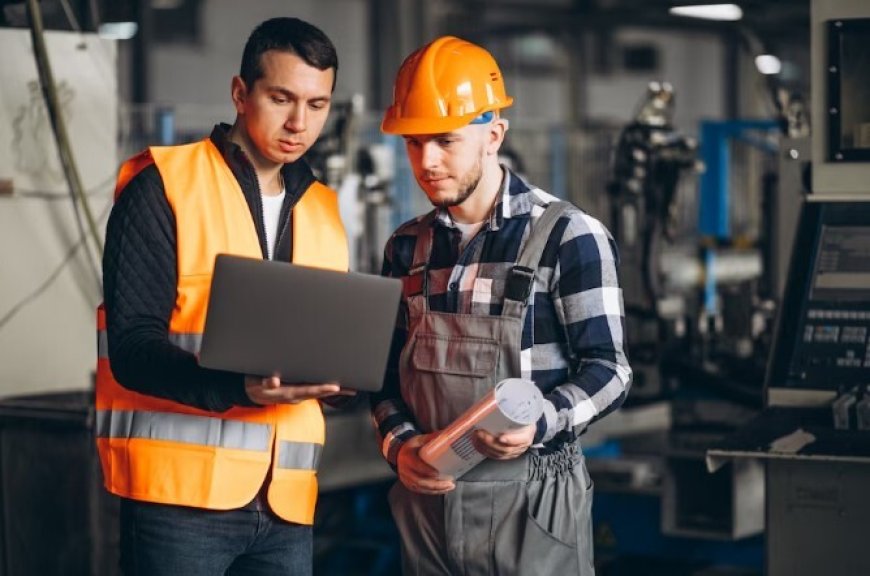How to Check Data Engineering Job Readiness
Design, build, and maintain scalable data infrastructure for efficient storage, processing, and analysis of large datasets.

where information powers critical business decisions, the role of data engineering has become paramount. Data engineers are the architects behind the scenes, designing and maintaining the complex frameworks that enable data collection, transformation, and storage. Assessing one's readiness for a data engineering role is crucial, as it ensures a solid foundation in the skills and knowledge required to excel in this field. This guide outlines the key aspects to consider when evaluating your preparedness for a data engineering job, helping you navigate the ever-evolving realm of data with confidence.
Importance of assessing data engineering job readiness
-
Effective Utilization of Resources: Assessing job readiness ensures that both job seekers and employers make the most of their time and efforts by aligning expectations with actual skills.
-
Reducing Turnover: Evaluating readiness can help prevent hiring candidates who lack the necessary skills, reducing the risk of turnover due to unmet expectations.
-
Optimizing Onboarding: A well-prepared candidate requires less onboarding, which saves time and resources for the employer and allows the candidate to contribute more quickly.
-
Ensuring Role Suitability: Assessments help match candidates' skills with the specific requirements of a data engineering role, leading to better job satisfaction and performance.
-
Meeting Industry Demands: With rapidly evolving data technologies, assessing readiness ensures candidates are up-to-date with the latest industry trends and tools.
-
Enhancing Team Performance: Having job-ready professionals strengthens the entire data engineering team, promoting collaboration and knowledge sharing.
-
Minimizing Risk: Skilled data engineers are more likely to produce accurate and reliable data pipelines, reducing the risk of errors that could impact business decisions.
-
Increasing Confidence: Job-ready candidates are confident in their abilities, which positively affects their work quality and interactions with team members.
-
Driving Innovation: Competent data engineers are better positioned to innovate, experiment, and implement new data solutions that drive business growth.
-
Career Advancement: Self-assessment of job readiness helps individuals identify areas for improvement, guiding them towards targeted skill development for career advancement.
Technical Knowledge and Skills
Data Storage and Processing Technologies
Data engineering entails a profound understanding of various data storage and processing technologies that form the backbone of modern data ecosystems. Familiarity with technologies like Hadoop and Spark is crucial. Hadoop's HDFS (Hadoop Distributed File System) enables the distributed storage of large datasets across clusters, while Spark offers powerful data processing capabilities, including batch and real-time processing. Proficiency in these technologies empowers data engineers to manage and process data efficiently at scale.
Database Systems
Mastery over different database systems is essential for a data engineer. This includes both relational databases (such as MySQL, PostgreSQL) and NoSQL databases (such as MongoDB, Cassandra). A solid grasp of SQL is fundamental for querying and manipulating relational databases, while comprehension of NoSQL databases is necessary for handling unstructured and semi-structured data. A skilled data engineer knows how to choose the appropriate database system based on the requirements of a given project.
ETL Processes and Tools
Extract, Transform, Load (ETL) processes are at the core of data engineering. Data engineers should be well-versed in designing and implementing ETL pipelines that enable the seamless movement of data from various sources to destinations. Proficiency in ETL tools like Apache NiFi, Apache Airflow, or commercial solutions like Informatica is vital. These tools facilitate data transformation, cleansing, and loading, ensuring that data is in the right format and quality for analysis.
Programming Proficiency
Programming Proficiency
Proficiency in programming languages is a cornerstone skill for any aspiring data engineer. Two widely used languages in data engineering are Python and Java. Python is favored for its simplicity and versatility, making it an excellent choice for scripting and data manipulation tasks. Java, on the other hand, provides robustness and performance for more complex data processing tasks. A solid grasp of these languages enables data engineers to write efficient and maintainable code for various components of data pipelines.
Data Manipulation Libraries
In the realm of data engineering, efficiency in data manipulation is essential. Familiarity with libraries like Pandas can significantly enhance a data engineer's ability to preprocess, clean, and transform data. Pandas, a powerful Python library, offers tools for data manipulation and analysis that streamline tasks such as filtering, aggregating, and reshaping data. Understanding how to effectively use such libraries is crucial for preparing data before it enters the ETL (Extract, Transform, Load) process, ensuring that downstream data processing is accurate and reliable.
Data Warehousing
Data warehousing is a crucial aspect of data engineering that involves the organization, storage, and retrieval of data for analytical purposes. It revolves around creating a central repository where data from various sources can be integrated and transformed into a structured format, optimized for analysis and reporting. Data warehousing solutions, such as Amazon Redshift and Google BigQuery, play a pivotal role in handling large volumes of data and enabling efficient querying across different dimensions. Understanding data warehousing concepts empowers data engineers to design and implement robust systems that provide quick and reliable access to information, ultimately aiding informed decision-making within an organization.
Cloud Platforms
Cloud platforms, such as Amazon Web Services (AWS), Google Cloud Platform (GCP), and Microsoft Azure, have become integral to modern data engineering. Proficiency in utilizing cloud services is a fundamental skill for data engineers. These platforms offer scalable and flexible resources for data storage, processing, and analysis. Familiarity with setting up virtual machines, databases, and data warehouses on the cloud is crucial. Cloud-based services enable data engineers to efficiently manage, process, and transform large datasets, while also providing the advantage of cost optimization. As data engineering increasingly shifts towards cloud-based solutions, a solid understanding of cloud platforms is indispensable for anyone aiming to excel in this field.
Data Quality and Governance
Data quality and governance are pivotal aspects of data engineering that ensure the reliability and accuracy of the information being processed and analyzed. Data quality involves maintaining clean, consistent, and accurate data throughout its lifecycle. This includes validating data, identifying and rectifying errors, and implementing processes to prevent future issues. Data governance, on the other hand, focuses on establishing policies, roles, and responsibilities for data management, ensuring compliance with regulations, and maintaining data security.
Effective data quality practices involve setting up validation checks, cleansing procedures, and data profiling to identify anomalies. By ensuring data conforms to predefined standards, data engineers contribute to better decision-making and more accurate insights for businesses. Data governance, meanwhile, establishes a framework for data ownership, access controls, and accountability, ensuring that data is used ethically and responsibly.
Data Pipelines
Data pipelines form the backbone of efficient data engineering processes, enabling the smooth flow of data from various sources to destinations where it can be analyzed and utilized. These pipelines encompass the Extract, Transform, Load (ETL) process, where data is extracted from diverse sources, transformed into a usable format, and loaded into target systems. Data engineers design, implement, and manage these pipelines, ensuring data integrity, quality, and reliability throughout the journey. A well-constructed data pipeline minimizes bottlenecks, optimizes data processing, and facilitates real-time or batch data movement, ultimately empowering businesses to make informed decisions based on timely and accurate data.
Collaboration and Communication
Effective collaboration and communication skills are essential aspects of data engineering job readiness. Data engineers frequently work in cross-functional teams alongside data scientists, analysts, and business stakeholders. Clear communication ensures that everyone understands project requirements, goals, and outcomes. Collaborating efficiently fosters a positive team environment, leading to better problem-solving and innovative solutions. Sharing insights, progress updates, and challenges among team members promotes a streamlined workflow and maximizes the impact of data engineering efforts. Aspiring data engineers should focus on honing their interpersonal and teamwork skills to thrive in the collaborative landscape of modern data-driven organizations.
Continuous Learning
Continuous learning is a cornerstone of data engineering job readiness. In the dynamic landscape of data technology, staying updated with the latest tools, techniques, and trends is essential. As data engineering evolves, professionals must remain agile and adaptable. This involves actively seeking out new resources, courses, and industry insights to enhance skills and knowledge. By embracing a mindset of perpetual learning, data engineers can not only ensure their readiness for current job roles but also position themselves as valuable assets in a rapidly changing field. Remember, in data engineering, the journey of growth is as important as the destination of being job-ready.
Self-Assessment and Resources
Self-Assessment:
-
Evaluate your programming skills in languages like Python, Java, or Scala.
-
Gauge your familiarity with databases, both relational (SQL) and NoSQL.
-
Assess your understanding of data processing frameworks, such as Hadoop and Spark.
-
Evaluate your experience with cloud platforms like AWS, GCP, or Azure.
-
Reflect on your knowledge of data warehousing concepts and tools.
-
Consider your ability to ensure data quality and implement data tests.
-
Assess your familiarity with version control systems like Git.
Resources for Improvement:
-
Online Courses and Tutorials: Enroll in platforms like Coursera, Udemy, or edX for structured learning.Follow tutorials on platforms like DataCamp, Towards Data Science, and YouTube.
-
Books and References: Recommended books: Data Engineering by Michael J. Kane, Designing Data-Intensive Applications by Martin Kleppmann. Online documentation for relevant technologies and frameworks.
-
Coding Practice Platforms: LeetCode, HackerRank, and CodeSignal offer coding challenges to enhance programming skills. Participate in data engineering challenges on platforms like Kaggle.
Achieving readiness for a data engineering role involves mastering a range of fundamental concepts and skills. From understanding ETL processes and databases to navigating data processing frameworks and cloud platforms, a solid foundation is crucial. The ability to ensure data quality, collaborate effectively, and adapt to evolving technologies further solidifies readiness. Self-assessment, hands-on projects, mock challenges, and technical interviews serve as essential assessment methods, guiding your preparation journey. Remember, continuous learning and improvement are paramount in this ever-evolving field. Embrace the dynamic nature of data engineering, and with the right resources, dedication, and practice, you can embark on a rewarding career path marked by innovation and growth.












































